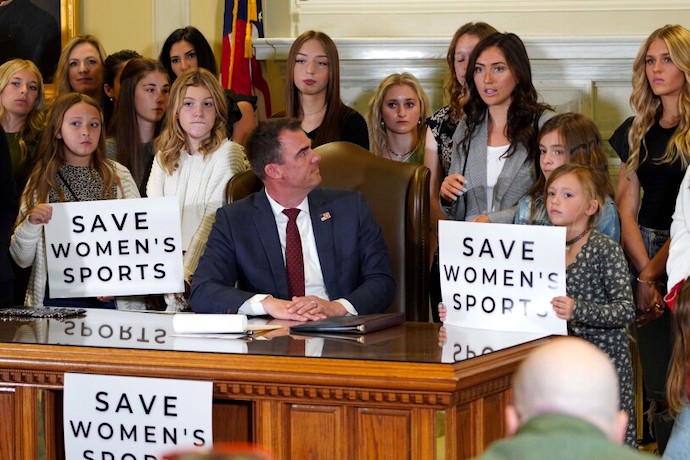Remember when transgender Americans seemed to be having a positive cultural moment? Former child actor and author Chaz Bono, Sonny and Cher’s transgender son, helped pave the way with a documentary about his experience that came out in 2011, the same year he was featured on Dancing With the Stars. I remember watching some of that season, pleasantly surprised that my conservative evangelical mom clearly sympathized with him as the show told parts of his story and Cher showed up to cheer him on.
Not long after, Daytime Emmy-winning actor and producer Laverne Cox, who is a trans woman herself, burst onto the scene, rising to prominence with her powerful and authentic portrayal of trans inmate Sophia Burset in Netflix’s hit Orange is the New Black, which aired from 2013-2019. Cox’s work was truly groundbreaking in terms of on-screen trans representation and helped educate the public about the realities of trans experience.
Meanwhile, Caitlyn Jenner came out in 2015, and while her right-wing Christian politics were and remain awful, her coming out generated a great deal of buzz about trans people. Despite the inevitable misgendering tantrums lobbed at Jenner by her fellow White evangelicals, Americans were learning about trans people, and that encouraged me as a trans woman who had yet to come out. I felt like acceptance was just around the corner.
How quickly times change. Things went downhill fast when Donald Trump became president and prioritized the Christian Right’s policy goals, including attacks on the rights of transgender Americans. And even now with Democrat Joe Biden as president and Democrats in control of the Senate, things continue to get worse for trans folks year over year.
It’s long been clear that the widespread use of false, inflammatory, and dehumanizing anti-trans rhetoric by right-wing activists and politicians generates a feedback loop that enables the proliferation and escalation of anti-trans legislation. And we’re now learning that the deluge of disinformation and hateful propaganda is also having a negative impact on trans acceptance in the general public—even among progressive demographics.
That, at least, is my grim takeaway from PRRI’s new report, “The Politics of Gender, Pronouns, and Public Education.” The overall positions of various demographics are mostly what you would expect them to be. The report singles out White evangelical Protestants multiple times as, unsurprisingly, America’s most singularly anti-trans demo. In 2021, for example, 86% of White evangelicals said there are only two genders, with that number rising to 92% in 2023. The report also states, “Among White Christian groups, White evangelical Protestants (82%) and Latter-day Saints (72%) are much more likely than White Catholics (51%) and White mainline/non-evangelical Protestants (50%) to strongly feel there are only two genders.”
None of this is particularly surprising, but what I do find both surprising and troubling is the direction of the trend among more progressive demographics regarding Americans’ understanding of gender. Take Democrats, for example. In 2021, 38% of Democrats maintained there are only two genders; two years later, that figure has gone up to 44%.
We see that same upward trend holding for Gen Z (43% in 2021 vs. a whopping 57% today) and millennials (51% and 60%, respectively). Black Protestants represent an exception to the general rule here; the corresponding figures for them are 73% and 71%, the trend remaining almost flat and perhaps going down. The trend also remained flat among Jewish Americans (44%), but got worse among the religiously unaffiliated, leaping from 38% to 46%.
While the understanding of gender as strictly binary or as nonbinary may not be a perfect indicator of trans acceptance overall, given the prominent place of the binary in anti-trans rhetoric, I think these attitudes represent a close enough proxy to raise concern among trans people and those who support our rights and dignity. Unfortunately, regarding the other questions covered in the report there is no comparative data from 2021. Overall, the rest of the data isn’t particularly encouraging, but there are a few exceptions.
For example, only 34% of Americans believe that it is never appropriate to teach in public schools that some Americans are transgender. This and similar figures regarding feelings about same-sex relationships—for which there is very little difference between those who are parents and those who aren’t—could be useful for fighting against the well-organized efforts of minority control over school libraries and curricula that right-wingers are waging across the country.
On the other hand, it’s concerning that only 41% of Americans would be somewhat or very comfortable learning that a friend is transgender, while a full third are willing to tell pollsters this would make them uncomfortable. I hope that PRRI and other research institutions and polling organizations will continue to ask questions like this one in subsequent years so that we can see whether Americans’ self-reported feelings about having transgender friends track with their understanding of gender as binary or non-binary.
In any case, the new PRRI report does give us at least one indication that the relentless and virulent conservative Christian and Republican efforts to flood public discourse with anti-trans views is having an impact beyond the passage of ever more draconian state-level policies in Republican-controlled states. There’s far more in the report than can be summarized here, and I encourage everyone to read it. But this much is clear: trans Americans are facing a lopsided struggle for acceptance against powerful and wealthy forces with massive platforms, and going ahead we need all the help we can get at winning the hearts and minds of our fellow Americans.





